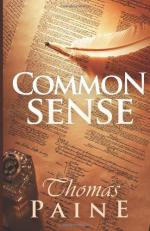Absolute governments (tho’ the disgrace of human nature) have this advantage with them, that they are simple; if the people suffer, they know the head from which their suffering springs, know likewise the remedy, and are not bewildered by a variety of causes and cures. But the constitution of England is so exceedingly complex, that the nation may suffer for years together without being able to discover in which part the fault lies; some will say in one and some in another, and every political physician will advise a different medicine.
I know it is difficult to get over local or long standing prejudices, yet if we will suffer ourselves to examine the component parts of the English constitution, we shall find them to be the base remains of two ancient tyrannies, compounded with some new republican materials.
First — The remains of monarchial tyranny
in the person of the king.
Secondly — The remains of aristocratical
tyranny in the persons of the peers.
Thirdly — The new republican materials
in the persons of the commons,
on
whose virtue depends the freedom of England.
The two first, by being hereditary, are independent of the people; wherefore in a constitutional sense they contribute nothing towards the freedom of the state.
To say that the constitution of England is a union of three powers reciprocally checking each other, is farcical, either the words have no meaning, or they are flat contradictions.
To say that the commons is a check upon the king, presupposes two things:
First — That the king is not to be trusted without being looked after, or in other words, that a thirst for absolute power is the natural disease of monarchy.
Secondly — That the commons, by being appointed for that purpose, are either wiser or more worthy of confidence than the crown.
But as the same constitution which gives the commons a power to check the king by withholding the supplies, gives afterwards the king a power to check the commons, by empowering him to reject their other bills; it again supposes that the king is wiser than those whom it has already supposed to be wiser than him. A mere absurdity!
There is something exceedingly ridiculous in the composition of monarchy; it first excludes a man from the means of information, yet empowers him to act in cases where the highest judgment is required. The state of a king shuts him from the world, yet the business of a king requires him to know it thoroughly; wherefore the different parts, by unnaturally opposing and destroying each other, prove the whole character to be absurd and useless.




